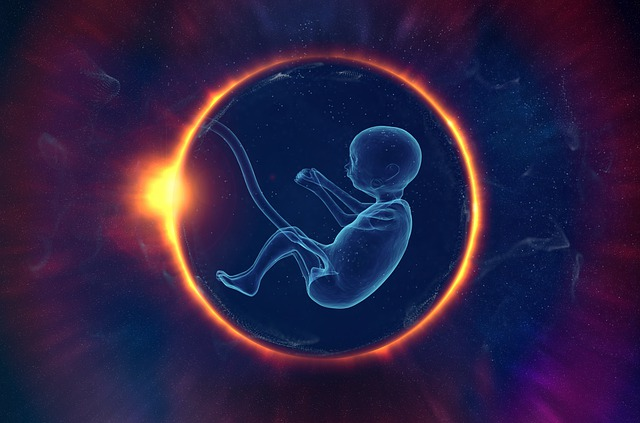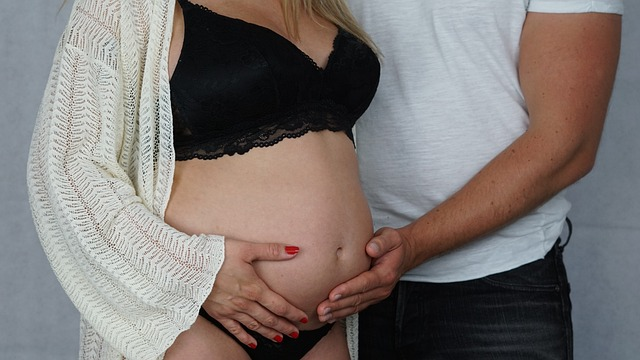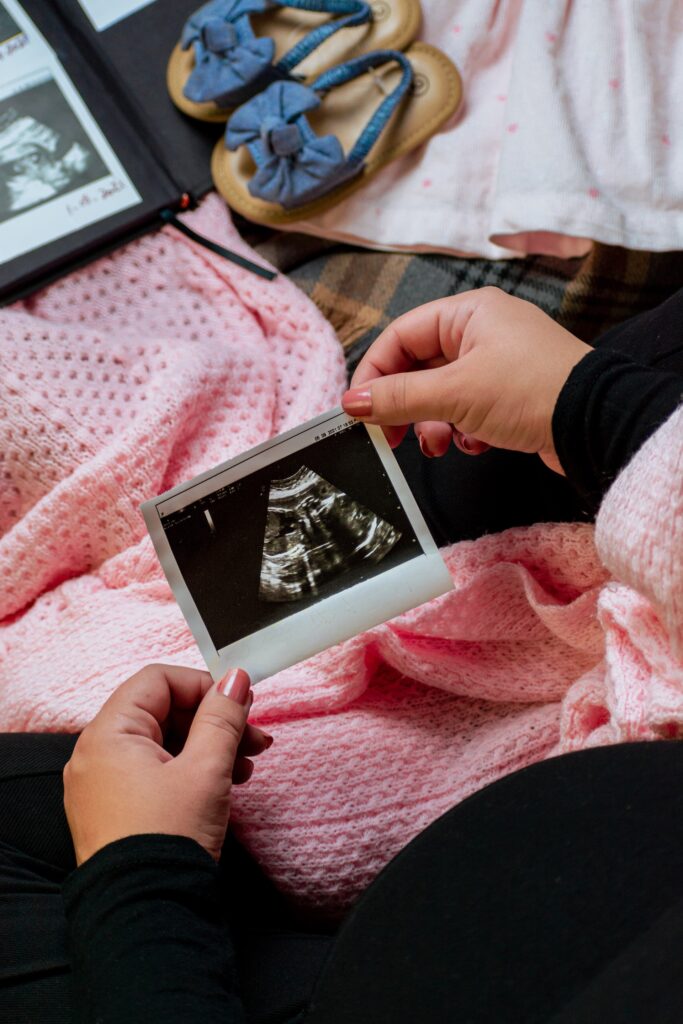The second part of the first trimester of pregnancy begins at week 7. Around this time, the embryo in your belly grows 10,000 times more than when it was first formed. The baby’s brain cells begin to generate at a rapid pace. It also starts to look more like an actual baby in form.

If you’re 7 weeks pregnant, you may expect more heightened symptoms. You still need to be careful because this week is a high risk for miscarriages. Here are other things you need to know:
Your Body at 7 Weeks Pregnant
For a first-time mom-to-be, your pregnant belly may not yet show at the 7th pregnancy week. But you may feel the tissues in your womb begin to stretch. It will accommodate your baby who’s growing rapidly at this stage. You may start having a baby bump earlier if it’s not your first pregnancy.
You may also expect your breasts to size up, which will continue throughout the pregnancy. In addition, your skin will have a healthier glow.
The 7th pregnancy week is critical. The placenta is still developing in your womb and attaching to the uterine wall. Pregnant women at this stage must remember to be extra careful. That way, you can avoid risking miscarriage.
Your Baby’s Development at 7 Weeks

Your baby at 7 weeks is about the size of a peanut. This is where it starts taking shape. Its limb buds lengthen and will later become arm and leg joints.
Per the American College of Obstetricians and Gynecologists, a developing baby at 7 weeks starts to:
- Form its brain and spine
- Have recognizable facial features
- Grow a pair of lungs and kidneys
The baby’s development inside you directly affects the changes in your own body. This comes with other early pregnancy symptoms, but not everyone experiences them.
Pregnancy Symptoms at Week 7
1. Morning sickness
You can expect a surge in pregnancy hormones at 7 weeks pregnant. In turn, that may result in nausea and vomiting in the morning. Heartburns, a burning sensation in the lower throat and chest, are also common.
Thankfully, morning sickness rarely lasts the entire pregnancy. It usually tones down by the second trimester.
2. Extra saliva due to pregnancy hormones
Another consequence of hormonal changes is extra saliva. The pregnancy hormone HCG may affect the function of your salivary glands.
3. Frequent urination
Do not be surprised when you feel the frequent urge to pee. Your baby at 7 weeks pregnant may be about the size of a peanut, but your uterus is already expanding. That causes more pressure on your urinary bladder.
There is also an increased blood flow to your pelvis, leading to frequent peeing.
4. Food aversions
You may feel aversion to certain foods, even those you used to enjoy before. In the worst-case scenario, just their smell or sight can induce nausea. This is due to the rapid boost of estrogen in the first trimester.
5. Craving nonfood items
One of the weird symptoms you might experience is craving nonfood items. Some moms-to-be may suddenly crave chalk, clay, or laundry detergent. This is a pregnancy condition called pica.
Pica often results from mineral deficiency, especially iron in anemic women. This is why you need to pay attention to your nutrition during pregnancy.
6. Muscle and abdominal pain
It will take a few weeks more before you feel the baby move in your belly. But that does not mean abdominal pain will also take longer. Cramps will be more common even in your other muscles.
If the pain is mild, it can go away by changing your position. But moms-to-be can get extra bodily support from maternity pillows.
7. Mood swings
Hormonal changes can result in extreme mood swings, more so in the 6th-10th week. It usually subsides. But the mood swings may return when you are nearing your due date.
8. Acne breakout and itchiness
Pregnancy hormones like progesterone can stimulate your oil glands. That leads to acne breakouts. You may also feel itchy due to the rise of said hormones in your blood.
Lifestyle Changes: What You Should and Should Not Do
1. Commit to your prenatal visit
It’s common for the first prenatal visit to happen in the 7th week of pregnancy. This will usually involve blood tests and physical exams. Your doctor will also talk to you about your lifestyle and health history.
Make sure to ask your healthcare provider about foods you should avoid. They will also prescribe you your prenatal vitamin.
What’s more? Your baby’s cardiac activity begins to stabilize at 7 weeks. That means you can pick up their heartbeat already! You can also request an ultrasound.
2. Stay hydrated
Due to frequent peeing, pregnant women are easily dehydrated. Hence, you have to drink plenty of water all the time.
Hydration helps your blood cells absorb essential nutrients from your diet. Those will be transported to your baby through the umbilical cord.
3. Use a gentle cleanser
Being pregnant does not mean you must abandon your skincare routine. Rather, give it more attention especially since you will be more prone to breakouts. To fight them, use a gentle cleanser safe for pregnant women.
You should also switch to an oil-free moisturizer if you haven’t already. Try to avoid fried foods as well. You can help tone down your pregnancy symptoms without harming your skin or your baby.
4. Eating smaller meals more often
You’ll likely hear people telling you to eat more for your baby. Of course, there’s a big chance you’ll get hungry more often. But pregnancy weight gain should also be balanced. Otherwise, it might cause difficulties in achieving a natural birth.
Instead of eating a feast every mealtime, opt for smaller meals more often. Include fresh fruits in your meal plans, too.
5. Do light to moderate aerobic exercises
Exercising during pregnancy may seem like a scary idea at first. But it’s a healthy thing to do. Just make sure you’re not doing anything too heavy to handle. It would be good to ask for your healthcare provider’s advice.
Light to moderate exercises are helpful for pregnant women. Thirty minutes of walking or doing water workouts will keep your heart rate good. You can also do prenatal yoga to prepare for the flexibility needed for giving birth.
Stop right away and call a doctor if you experience these while exercising:
- Chest pain
- Dizziness
- Contractions
- Vaginal bleeding
Tips for Your Partner
Moms-to-be are not the only excited ones during pregnancy. Dads-to-be are just as thrilled, but they are also as nervous. And, there is less guidance given to them during this time since they’re not carrying the baby.

Here are tips for dads-to-be on supporting their partner’s pregnancy:
1 . Help out with household chores
This is a crucial time for them to take initiative when it comes to housework. It’s not good for pregnant women to bend down to pick up things from the floor. So, the man in the house can take charge of cleanliness.
2. Encourage healthy lifestyle choices
Dads-to-be can offer support by helping their partners eat healthy, exercise, and take vitamins. If they used to smoke or drink before pregnancy, it would be a good idea to refrain from doing so.
3. Massage their partners
Muscle pains are common for pregnant women. So, their partners offering a good massage is excellent.
4. Stay calm
No matter what happens, stay calm. Pregnant women tend to be easily emotional, so their partner must be a source of stability.
Frequently Asked Questions
1 . What is the baby’s position at 7 weeks?
The baby is starting to develop recognizable features in the amniotic sac. The placenta is beginning to form and attach to the uterine wall.
2. Can you feel your baby move at 7 weeks?
It is unlikely to feel your baby’s movement at 7 weeks. After all, they are only starting to develop upper and lower limbs.


